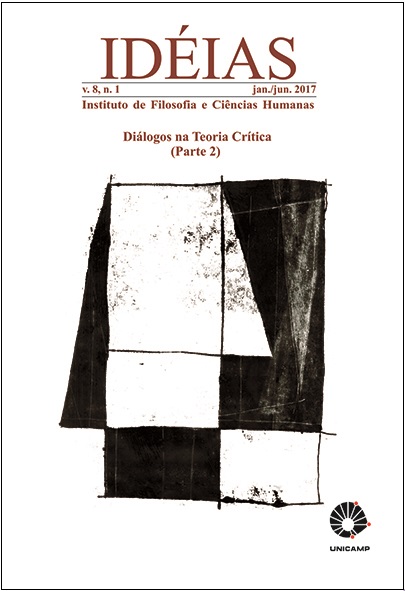Resumen
Simone de Beauvoir has been commonly criticized for separating women from nature and attempting to make women “like men”, as beings that dominate nature. I defend Beauvoir’s existential concept of freedom as a non-sovereign relationship with nature. I then use the existential model constructed from my defense of Beauvoir as a framework with which to critique and engage Jürgen Habermas’ 2001 intervention against liberal eugenics. My critique of Habermas is important because I would like to explore a renewed critical theory of nature from the perspective gained by an existential ecofeminism.
Citas
BEAUVOIR, Simone de. The Second Sex. Trans. H. M. Parshley. New York: Vintage Books, 1952.
BEAUVOIR, Simone de. The Second Sex. Trans. Constance Borde and Sheila Malovany-Chevallier. New York: Vintage Books, 2011.
BERGOFFEN, Debra. Simone de Beauvoir. In: Stanford Encyclopedia of Philosophy. 2014. Available at: https://plato.stanford.edu/entries/beauvoir/. Accessed: 15 Jan. 2016.
BIRO, Andrew. Towards a Denaturalized Ecological Politics. Polity, v. 35, n. 2, p. 195-212, 2003.
BIRO, Andrew. Nature or “Nature”? Ecological Politics and the Postmodern Condition. In: Denaturalizing Ecological Politics: Alienation from Nature from Rousseau to the Frankfurt School and Beyond. Toronto: University of Toronto Press, 2005, p. 3-11.
BORDO, Susan. Unbearable Weight: Feminism, Western Culture, and the Body. Berkeley: University of California Press, 1993.
BORDO, Susan. Simone de Beauvoir: The Feminist Philosopher as Other. In: BORDO, Susan; ALCALDE, M. Cristina; ROSENMAN, Ellen (eds.). Provocations: A Transnational Reader in the History of Feminist Thought. Oakland: University of California Press, 2015, p. 193-99.
BUTLER, Judith. Variations on Sex and Gender. In: BENHABIB, S.; CORNELL, D. (eds.). Feminism as Critique. Minneapolis: University of Minnesota, 1987, p. 128-142.
CAMPBELL, Colin. From “Unity of Life” to the Critique of Domination: Jonas, Freud, and Marcuse. In: BIRO, Andrew (ed.). Critical Ecologies: The Frankfurt School and Contemporary Environmental Crises. Toronto: University of Toronto Press, 2011, p. 139-62.
CUDWORTH, Erika. Developing Ecofeminist Theory: The Complexity of Difference. New York: Palgrave Macmillan, 2005.
DIAMOND, Irene; ORENSTEIN, Gloria Feman (eds.). Reweaving the World: The Emergence of Ecofeminism. San Francisco: Sierra Club Books, 1990.
FERRY, Luc. In Praise of Difference, or the Incarnations of Leftism: The Case of Ecofeminism. In: The New Ecological Order. Chicago: University of Chicago Press, 1995, p. 108-26.
HABERMAS, Jürgen. Erläuterung zur Diskursethik. Frankfurt am Main: Suhrkamp, 1991.
HABERMAS, Jürgen. Remarks on Discourse Ethics. In: Justification and Application. Trans. Ciaran Cronin. Cambridge, MA and London: MIT Press, 1993, p. 19-111.
HABERMAS, Jürgen. The Future of Human Nature. Trans. William Rehg, Max Pensky and Hella Beister. Cambridge: Polity Press, 2003.
HAY, Peter. Main Currents in Western Environmental Thought. Bloomington and Indianapolis: Indiana University Press, 2002.
KIERKEGAARD, Søren. The Sickness Unto Death. Trans. Hong and Hong. Princeton: Princeton University Press, 1983.
KIERKEGAARD, Søren. Either/Or, vol. I and vol. II. Trans. Hong and Hong. Princeton: Princeton University Press, 1987.
KING, Ynestra. Feminism and the Revolt of Nature. Heresies, n. 13: Earthkeeping/Earthshaking: Feminism & Ecology, p. 12-16, 1981.
MARCUSE, Herbert. Reason and Revolution. London: Routledge and Kegan Paul, 1941.
MORGAN, Marcia. Heller and Habermas in Dialogue: Intersubjective Liability and Corporeal Injurability as Foundations of Ethical Subjectivity. Revue Internationale de Philosophie, v. 3, Brussels, p. 303-320, 2015.
PLESSNER, Helmuth. Laughing and Crying: A Study of the Limits of Human Behavior. Trans. J. S. Churchill and M. Greene. Evanston, IL: Northwestern University Press, 1970.
PLESSNER, Helmuth. Die Stufen des Organischen und der Mensch. Einleitung in die philosophische Anthropologie. In: Gesammelte Schriften, vol. 4. Frankfurt am Main: Suhrkamp, 1981.
PLUMWOOD, Val. Ecofeminism: An Overview and Discussion of Positions and Arguments. Australian Journal of Philosophy, v. 64, supplement, p. 120-138, 1986.
PLUMWOOD, Val. Feminism and the Mastery of Nature. London and New York: Routledge, 1993.
PLUMWOOD, Val. Nature, Self, and Gender: Feminism, Environmental Philosophy, and the Critique of Rationalism. In: ZIMMERMAN, M. et al. (eds.). Environmental Philosophy. Upper Saddle River, NJ: Prentice Hall, 1998, p. 291-314.
PLUMWOOD, Val. Deep Ecology, Deep Pockets, and Deep Problems: A Feminist Ecosocialist Analysis. In: KATZ, A; LIGHT, E. and ROTHEMBERG, D. (eds.). Beneath the Surface: Critical Essays in the Philosophy of Deep Ecology. Cambridge, MA and London: MIT Press, 2000, p. 59-84.
QUINBY, Lee. Ecofeminism and the Politics of Resistance. In: DIAMOND, Irene; ORENSTEIN, Gloria Feman (eds.). Reweaving the World: The Emergence of Ecofeminism. San Francisco: Sierra Club Books, 1990, p. 122-7.
TONG, Rosemarie. Feminist Thought. Boulder, CO: Westview Press, 2014.
VOGEL, Steven. Against Nature: The Concept of Nature in Critical Theory. Albany: State University of New York, 1996.
VOGEL, Steven. Thinking Like a Mall: Environmental Philosophy After the End of Nature. Cambridge, MA: MIT Press, 2015.
A Idéias utiliza a licença do Creative Commons (CC), preservando assim, a integridade dos artigos em ambiente de acesso aberto.

